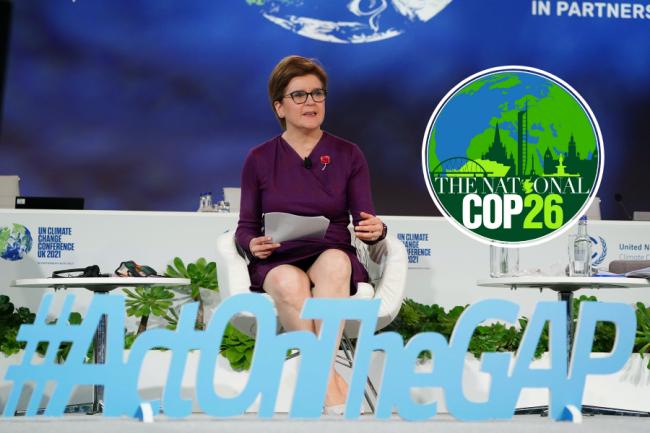The lack of representation of women and girls in the climate negotiations and the disproportionate impact of the climate crisis were discussed on ‘Gender Day’ at COP26 held in Glasgow, Scotland.
Climate crisis cannot be ended without the empowerment of women, politicians and campaigners tell summit.

At the UN Climate Summit meetings held in Glasgow, Scotland, both the representation of women and girls in the climate negotiations and the disproportionate impact of the crisis were discussed in the context of the climate breakdown.
Delegates at the COP26 summit were told that the world designed by men has destroyed many things, and leaders and campaigners were warned that the climate crisis cannot be solved without empowering women.
The focus on gender equality on Tuesday saw indigenous women and politicians including Scotland’s first minister, Nicola Sturgeon, and Nancy Pelosi, speaker of the US House of Representatives, demand increased investment.
Angelica Ponce, executive director of the Plurinational Authority for Mother Earth in Bolivia, said: “The world as designed by men has destroyed many things. The world should begin thinking like women. If it was designed by a woman, it would end violence against women and children.
“We want to be in the corridors of power and take part in decisions at international level to end this struggle of climate justice,” she said. “As indigenous women, we live day-by-day the cruel reality of climate change in our land.”
Sturgeon said: “When world leaders gathered here last week, of the 120 or so, a tiny minority were women – that needs to change and it needs to change quickly. There is no doubt, we must ensure that climate change is a feminist issue. [But] women are not pleading to be supported. We’re demanding to be empowered.”
Alok Sharma, the UK minister and president of COP26, said: “We know from our efforts to tackle climate change that it is more effective when we put women and girls at the heart of those efforts.”
Climate-related events will prevent at least 4 million girls in lower-income countries from completing their education in 2021, he said, citing a Malala Fund report. On current trends, the climate crisis will contribute to at least 12.5 million girls not completing their education each year, the report said.
Per Olsson Fridh, Sweden’s minister for international development cooperation, told COP26: “Women are not the polluters of this world, yet, they carry the consequences of climate change on their shoulders. Without a gender perspective, we miss out on invaluable knowledge needed for a sustainable green transition. A feminist approach is simply the only smart thing to do.”
Pelosi said: “If I ruled the world, the one thing that I would do is invest in the education of women. When women succeed, the world succeeds.”
Åsa Regnér, from UN Women, said: “Only 3% of the climate overseas development aid actually targets women’s rights and gender equality specifically. The UN, with its convening power, should really address that because as long as we don’t have the resources, little will happen.”
Guiding principle: Gender justice
While Canada’s climate change ambassador, Patricia Fuller ensured that as part of Canada’s climate finance commitment in five years, 80% of the projects will target gender equality outcomes, while Germany announced that Germany also announced that gender justice was to become a “guiding principle” for its €4.5bn (£3.8bn) International Climate Initiative.
Sharma said: “We have the [UN climate convention’s] Gender Action Plan, agreed back in 2019. But what we actually need is for every single country to implement this plan and to be guided by the UN Women-convened Feminist Action for Climate Justice Coalition, which launched earlier this year.”
İlayda Eskitaşcıoğlu, a member of the UN’s Generation Equality Campaign Global Youth Task Force participating in COP26, evaluated the sessions on gender as followed:
“In previous COPs and feminist action in climate justice, the discourse went no further than this: Women and girls are disproportionately affected by climate disasters and climate change. Here, women and girls were treated as figures without willpower, more like victims and in need of help. We see that we are going beyond thiss At COP26 this was very clear. It was accepted that women were not only victims but also pioneers of change, and it was a topic that everyone touched upon during their speeches. ”
“There was a lot of discussion on gender mainstreaming at the panels. As a gender equality advocate, I try to put it on our agenda as much as I can. One of the action coalitions in UN Women’s Generation Equality campaign is entirely based on climate change. Likewise, I think that the mainstreaming of the climate issue within the feminist movement has not been sufficiently addressed.”
“Those who suffer from the failures to ensure the accessibility of the COP26 were again disproportionately women, and mostly women with intersectional identities have a problem of accessing the COP and international platforms where climate action is discussed. Unfortunately, this has not been mentioned enough.”
Sources: Guardian, EKOIQ

